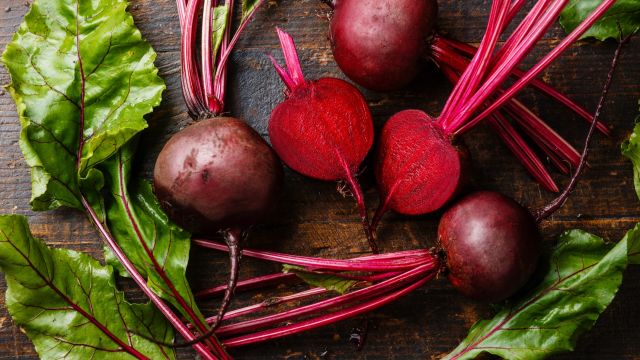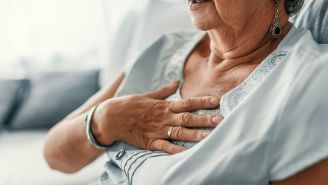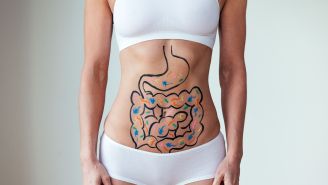Seeing drops of red in your stool is scary, especially when you don’t know why. Often, the cause is benign—red food like beets or cake frosting can change the color of your poop. But sometimes, those flecks really are blood, and they can indicate a more serious health issue.
What a normal bowel movement is like
Healthy bowel movements should be brown, look like a sausage and be smooth and soft, says physician assistant Al Bisong of Citrus Primary Care in Citrus Springs, Florida. Going to the bathroom shouldn’t be painful and shouldn’t take more than 10 minutes or so, he adds. You shouldn’t have to push or strain, and you shouldn’t have so much urgency you can barely hold it in.
As for frequency, everyone has their own habits. One to two movements a day is normal for some, while two or three a week is normal for others.
Needless to say, there should be no blood in your stool. If you notice it in the toilet or on the toilet paper, reach out to your healthcare provider (HCP). Make sure to mention any additional symptoms, and be mindful if you’ve had red food or beverages recently. For severe bleeding, don’t wait—get emergency help as fast as you can.
6 reasons you may have blood in your stool
A number of health conditions may be signaled by blood in the stool. These include the following:
Anal fissures
Trauma from hard, dry or loose, frequent bowel movements may cause small, painful tears around your anus, called fissures. But eating a high-fiber diet that includes lots of water can help give the fissures a chance to heal. In the meantime, stool softeners, sitz baths and topical medications such as lidocaine could ease your pain.
Internal hemorrhoids
Hemorrhoids are inflamed veins located in the lining of the anus or lower rectum, or the last section of your large intestine (colon). Common hemorrhoid causes include straining regularly to poop, or prolonged constipation or diarrhea. Stool softeners, warm baths, adding more fiber to your diet and adopting proper pooping habits can relieve symptoms.
Most doctors recommend lifestyle changes and over-the-counter pain relievers and hemorrhoid creams before having procedures like rubber band ligation, sclerotherapy, hemorrhoidectomy or stapling. These more serious treatments are used when the first round of treatment options aren’t effective.
Colorectal polyps
Polyps are abnormal growths that develop in the inside lining of your colon or your rectum and may bleed. They affect 15 to 40 percent of American adults. Most cases of colorectal cancer, the second-deadliest cancer among Americans, start off as polyps. That said, though some colorectal polyps are cancerous, most are not.
Typically, polyps are easily removed during a colonoscopy. Most doctors recommend removing them in case they are pre-cancerous or cancerous.
Angiodysplasia
Swollen, abnormal blood vessels in the beginning part of the colon may signal angiodysplasia, says Bisong. This condition is most common in adults, since the aging process can break down those vessels. Most of the time, the bleeding stops on its own, but a colonoscopy or procedure to block the artery may be necessary if you continue to bleed. Recurring, severe bleeding might require surgery to remove part of the colon.
Diverticular disease
When small pouches form in the inside wall of the colon, it’s called diverticulosis. Many people have these pouches. But if they become infected or inflamed, the condition is known as diverticulitis. Symptoms include abdominal pain, fever, nausea, vomiting, cramps and, although uncommon, rectal bleeding. Treatment may include fiber supplements, a drug called mesalazine, antibiotics and pain relievers. Severe cases may require surgery.
Ulcerative colitis
One of the two primary types of inflammatory bowel disease (IBD), ulcerative colitis (UC) occurs when the colon becomes inflamed and develops open sores. Common UC symptoms include bloody stool, abdominal pain, diarrhea, weight loss and fatigue. You may find yourself having to go to the bathroom more frequently, as well.
UC treatment typically involves medication to reduce inflammation and the activity of the immune system. You may also need to eliminate food and drink that aggravates your symptoms, such as alcohol or dairy products. In severe cases, surgery to remove the colon may be recommended.
The other major type of IBD is Crohn’s disease. People with Crohn’s may bleed if their colon is significantly affected by the illness.
3 ways to keep your bowels healthy
Even if you don’t have blood in your stool, it’s important to take measures to keep your bowels healthy. Try these tips:
Understand your bowel schedule
Tune into your day-to-day poop cycle, and take note if consistency, composition or frequency change.
Eat a high-fiber diet and drink lots of water
A bowel-healthy diet consists of plenty of fiber-rich foods like beans, whole grains and fruits and vegetables. Some people may benefit from fiber supplements, but speak with your HCP before taking them. Women should aim for about 25 grams of fiber per day, and men should shoot for 38 grams. Make sure to drink plenty of water, too.
Don’t wait until you’re constipated
If you wait to address your pooping problems until you’re constipated, you may be increasing your risk of health issues. See your HCP if your bowel movements aren’t flowing regularly, says Bisong.
“Sometimes, we wait a little too long because it’s not painful,” he says. “But if you see a doctor at the first signs of blood or other problems, the condition probably won’t get to an advanced stage.”







